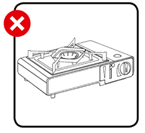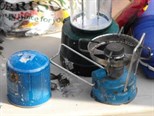Boat owners are advised to avoid using portable gas appliances with integral gas canisters on board boats
Boat owners to treat all such portable gas equipment with great respect and change fuel canisters away from the boat and sources of ignition.Even portable gas equipment can cause an explosion big enough to send people to hospital.Escaped lpg from only one can form a flammable gas cloud the size of 250 cans.In the poorly ventilated, tight confines of a boat escaping gas is more dangerous than when it happens ashore out in the open. |
 An explosion on the Norfolk Broads saw two people taken to hospital for treatment for burns to their legs, hands and faces.The explosion happened when the gas canister of a camping stove was being changed in the open cockpit of a small sailing boat where candles and cigarettes were in use. An explosion on the Norfolk Broads saw two people taken to hospital for treatment for burns to their legs, hands and faces.The explosion happened when the gas canister of a camping stove was being changed in the open cockpit of a small sailing boat where candles and cigarettes were in use. |
Think about the alternatives, for example, if all you want is a hot drink onboard a day boat, a flask is probably the simplest and safest way. If wanting light, some battery powered or wind-up LED lights will last for ages and are far easier to use than gas lanterns.
Where a simple cooker is needed aboard, think about installing a marine spirit stove as an alternative to a portable gas stove.
Anyone using a portable gas appliances has to be completely familiar with the correct and safe way of operating the appliance, from taking out of its storage case to fitting new fuel canisters.
- Only use portable appliances onshore.
- Stow the canisters, used or unused and any appliance if it has a canister inserted, in a self-draining gas locker, or on open deck where any escaping gas can flow overboard.
- Be familiar with the operating instructions before use.
- Before you start, check the appliance’s condition, if the gas canister seal looks damaged, or if the appliances or gas canister is extremely rusty and deteriorated, do not use it.
- To avoid gas leaks and carbon monoxide poisoning check that all equipment has been correctly assembled before turning it on.
- Never attempt to fit a new canister to an appliance when aboard, wait until you are onshore.
- Before fitting a canister, put out all open flames and smoking materials.
- Ensure that you have the correct type of gas canister for your appliance and that it is being inserted in the right place and in the right way.
- If you smell or hear gas leaking before attempting to light an appliance, don’t use it.
- If any gas is leaking, ensure that it is being dispersed in free air well away from the boat or any sparks or other sources of ignition.
Inland waterway regulations do not ban portable gas equipment on boats, but when not in operation, any appliance with a canister fitted and all spare gas canisters, empty or full, must be stowed in lockers that are self-draining, or on open deck areas where any leaking gas will flow overboard. The risk of causing a pool of explosive vapour inside the boat must be avoided.






